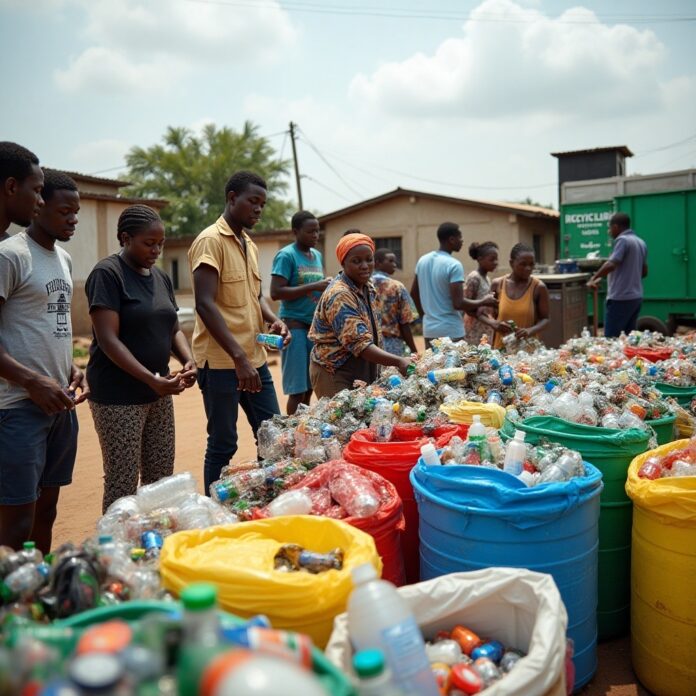Let’s start by facing the hard truth: Nigeria generates 2.5 million tons of plastic waste annually, with Lagos alone contributing 870,000 tons. Less than 10% is recycled, leaving rivers choked, landfills overflowing, and communities drowning in pollution. But here’s the twist—this crisis is also a $10 billion economic opportunity waiting to be unlocked.
🏗️ BuildNaija Expo 2025!
🗓️ May 30-31 | Online Event via Google Meet
You’re probably thinking, “How does plastic waste become a goldmine?” Simple: demand. Nigerian manufacturers are scrambling for recycled plastics to cut costs, and global markets like the EU are buying high-quality recycled flakes. Startups like Kaltani and Wecyclers are already cashing in, turning trash into cash while cleaning up neighborhoods.
Understanding Nigeria’s Plastic Waste Landscape
But challenges? Oh, they’re real. Imagine trying to recycle when waste collection is patchy, and informal pickers handle 80% of the work without proper tools or training. Power outages? They’re the norm, forcing innovators like Vicfold Recyclers to get creative with solar-powered shredders. Yet, this chaos is where opportunity thrives. Universities like UNILAG and Nile University are now launching microfactories to turn campus waste into construction materials and furniture—proof that localized solutions can spark systemic change.
Building Localized Collection Networks
Let’s talk about you. If you’re an eco-conscious household in Lagos or Abuja, how do you even begin recycling? Start small: partner with startups like Scrapays or RecyclePoints, which let you sell plastic waste via apps for cash or food vouchers. Picture this: you drop off a bag of PET bottles at a gas station kiosk, earn points for rice, and sleep knowing that bag won’t clog a drain. It’s happening right now in Abidjan with Coliba Africa—and they’re expanding to Nigeria soon.
But what if you want to go bigger? Start a community collection hub. Take inspiration from Chanja Datti, which collaborates with schools and markets to set up drop-off points. Or follow the women of Bauchi State, who transformed plastic sachets into handbags and clocks, earning income while slashing pollution. The key? Leverage existing networks. Nigeria’s informal waste pickers are the backbone of recycling—train them, equip them with apps like Coliba’s, and watch efficiency soar.
🏗️ BuildNaija Expo 2025!
🗓️ May 30-31 | Online Event via Google Meet
Processing Machinery – Your Toolkit for Turning Trash into Treasure
Let’s get practical. You’ve collected plastic waste—now what? Machinery. But don’t panic. In Nigeria, you don’t need a million-dollar factory. Start small. A basic setup includes a shredder (to chop plastics into flakes) and an extruder (to melt flakes into pellets). Total cost? As low as ₦1.5 million for second-hand machines.
Here’s the hack: Niji Group in Ibadan sells locally fabricated shredders that run on solar power—no more battling grid outages. Or check out Innoson Machinery in Enugu; their modular systems let you scale as profits grow. Still too pricey? Partner with fabrication hubs like MakerFaire Lagos to build DIY machines from scrap parts. A youth group in Kano did this, creating a low-cost shredder from motorcycle engines.
Government Grants – Free Money Exists. Here’s How to Grab It
Let’s cut through the noise: Nigeria’s government is funding green projects, but most people don’t know how to apply. For example, the Bank of Industry (BOI) offers loans at 5% interest for recycling startups. Requirements? A registered business, a solid plan, and collateral. No collateral? Try Lagos State Employment Trust Fund (LSETF)—they’ve funded 15 recycling SMEs since 2022
Case Studies – How Nigerians Like You Are Winning the Plastic War
Let’s get real: Recycling isn’t just theory. Meet Doyinsola Ogunye, a Lagos lawyer who ditched her courtroom career to launch RecyclePoints. Today, 20,000 households trade plastic for groceries, and she’s expanded to Ogun State. Her secret? “Start where people feel pain—hunger.” By linking waste to food vouchers, she turned apathy into action.
🏗️ BuildNaija Expo 2025!
🗓️ May 30-31 | Online Event via Google Meet
Or Ifedolapo Runsewe, founder of FreeRecycle, who saw flooded streets in Ibadan and built a network of 500 women collecting PET bottles. They now supply 10 tons/month to a factory making polyester yarn. “We’re not just cleaners; we’re suppliers to global fashion brands,” she says.
Challenges and Solutions – How to Dodge Pitfalls Like a Pro
Let’s not sugarcoat it: Recycling in Nigeria is a gladiator sport. Power cuts? Go solar. Startups like Green Energy Africa sell portable solar shredders for ₦2.5 million—payback in 18 months via saved diesel costs. No community buy-in? Copy RecycleNG’s “Plastic-for-School-Fees” program in Kano, where parents pay tuition with waste.
How Households Can Get Involved – Your Trash, Your Power
- Sort Your Waste Like a Pro: Keep bins for PET, HDPE, and rinsed containers.
- Sell to Survive: Earn ₦5,000/month via apps like Scrapays.
- Turn Trash into School Fees: Swap 20kg of plastic for tuition in Kano.
- Join the “Bucket Brigade”: Use 50L buckets as mini hubs; tag @GreenJanitors for pickup.
🏗️ BuildNaija Expo 2025!
🗓️ May 30-31 | Online Event via Google Meet
- You’ve unlocked a blueprint to turn Nigeria’s plastic curse into a revolution—one bottle, one community, one kitchen at a time. The power isn’t “out there.” It’s in your hands. What’s your first move?




